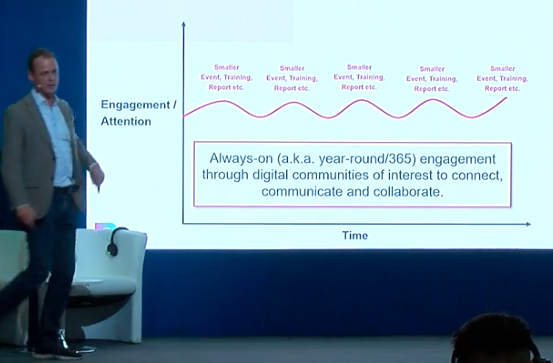Most B2B media businesses are keen to establish online communities but find it hard to build engagement and prove the return on investment. At The Publishing Show, Ashley Friedlein, Founder of Econsultancy and community platform Guild, shared practical tips on how to build a successful community and deliver value back to a B2B media business.
Why is interest in B2B communities growing now?
B2B media are moving their business model from occasional spikes of intense activity, traditionally around live events, to recurring revenue, such as subscriptions or memberships. To support this shift, they need to engage their audience all year round, and are looking to online communities to provide continuous connection.
Trust in institutions is declining, and business execs are more likely to consult their peers and colleagues. Meanwhile mass marketing channels such as email and LinkedIn are becoming less effective.
Tech firms in education, marketing and virtual events have spotted the potential in community tech. Salesforce has acquired The CMO Club, Hubspot acquired The Hustle and Stripe acquired Indie Hackers, among others.
The pandemic and the rise in remote working has raised the profile of online communities as they make it easier for a geographically dispersed group to share information.
What’s the value of B2B communities?
Communities are exceptionally good at building an emotional connection. They excel at building loyalty and advocacy among an influential group. They are less effective at driving mass awareness. So, focus your community on engaging your best customers and ensuring they renew.
Sponsorship is a direct way to generate revenues from a community, although the sponsor needs to appreciate that they can’t use the environment for sales pitches.
Communities are also a natural place to talk about added value products like subscription, membership, training or e-learning.
And analysing discussions in your community can provide “conversational intelligence” from identifying the hot topics for events or publications, to understanding the sentiment around alternative suppliers and vendors. Ashley shared analysis of the CREO group of event organisers discussing virtual and hybrid events and feedback on a range of event tech platforms.
How to build an engaged B2B community
• A community needs a clear purpose – a reason for members to gather and discuss. Simply providing the tech and leaving them to it won’t work.
• The community host is a crucial role. They need to be senior and knowledgeable enough to be credible and skilled at engaging members. Communities must be actively curated and facilitated – they don’t just happen spontaneously. But don’t delegate community to a junior marketer – better to have a senior editor or industry leader taking a major role.
• B2B communities need not be large, in fact scale can work against you. Many on Guild are in the 100-300 size range. Larger communities can lose the sense of intimacy and take on more of a marketing role.
• Beware of posting too much “content.” Members are flooded by content and might value more highly a short answer to a specific question.
• The tech platform matters less than the quality of the membership, host, and conversations. Some platforms work well with newsletters. Ashley has written a detailed post on alternative platforms.
• Some people may lose interest and it is fine to prune the group from time to time to remove dormant members. Ashley is part of a group that requires all members to complete an annual survey to stay in the group.
• Events are not “communities.” Just because you bring people together in a venue for a day or two that doesn’t constitute a community where people feel a strong connection and want to learn from each other.
• Actively encourage high quality engagement and set a good standard. Welcome new joiners, interview interesting members, run round tables or “Ask Me Anything” sessions.
• Start with one group – avoid the temptation to create multiple specialist subgroups. Wait till you have critical mass and then if there is a clear sub-topic or subgroup set it up separately.
• When conditions allow, it is ideal to bring your online community together in person at least once a year, to deepen relationships and prompt discussion.
Why communities add value to B2B media
B2B communities take time and attention to establish and thrive. The cost is more in the people running it than the tech platform. But they are an invaluable source of insight for media businesses and build loyalty and advocacy among influential members. In the long term this will support recurring revenue business models.
Ashley runs a group on Guild called Professional Community Leaders exploring best practice in community management. More info and how to request to join here.
I run a community, The Speciall Media Group, with over 150 leaders in niche publishing. More info and how to request to join here.
If you want to have a chat about how you can develop a community for your B2B media business, do get in touch.
About the author
Carolyn Morgan has bought, sold, launched and grown specialist media businesses across print, digital and live events. A founder of the Specialist Media Show (sold in 2014) she now advises media businesses large and small on their digital strategy through her consultancy Speciall Media.
Find out more about the advice we provide for publishers

